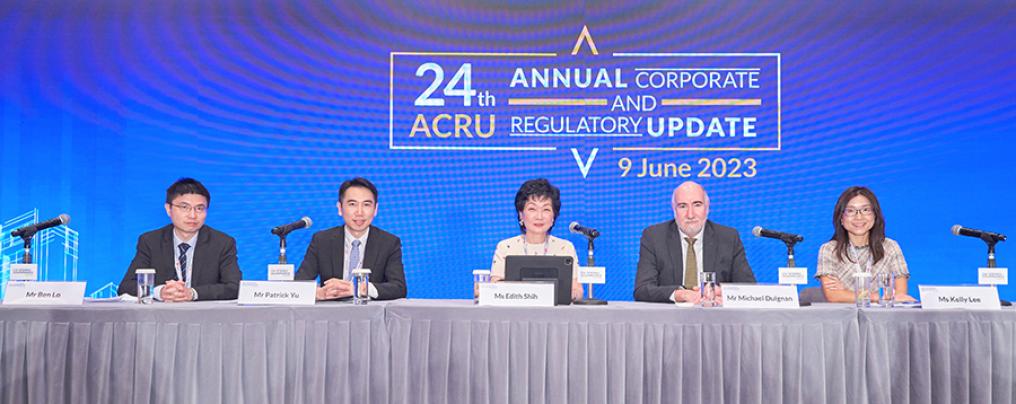
Good governance: a collaborative effort – ACRU 2023 review (part one)
The benefits of closer regulatory collaboration in combating corporate fraud and misconduct was one of the key themes discussed at the Institute’s 24th Annual Corporate and Regulatory Update (ACRU), held in hybrid mode on 9 June 2023.
Highlights
- the theme of regulatory collaboration was visually apparent at ACRU 2023 as speakers from HKEX and the SFC jointly presented the first two sessions
- one of the key advantages of this collaboration is that the regulators can ensure that appropriate enforcement tools are applied to different cases
- good governance is not something that follows necessarily from good rules and active regulators – it is a collaborative effort involving many different stakeholders
The Institute’s ACRU forum, probably the best known of the Institute’s CPD offerings, is an excellent way for companies and the governance professionals advising them to stay up to date with all the latest enforcement trends and strategies in Hong Kong. This article highlights one of the central themes to emerge from this year’s ACRU – the way regulators and law enforcement agencies have been able to raise the effectiveness of their investigations and enforcement efforts by means of much closer collaboration.
Collaboration in listing enforcement
The central theme of ACRU 2023 was particularly in evidence with regards to the listing enforcement strategies of Hong Kong Exchanges and Clearing Ltd (HKEX) and the Securities and Futures Commission (SFC). In a departure from previous ACRUs, speakers from the SFC and HKEX jointly presented the first two sessions of the forum.
Jon Witts, Head of Enforcement, Listing Division, HKEX, emphasised that Hong Kong has been well served over the years by its enforcement framework. Under this framework the SFC is the principal regulator of Hong Kong’s securities and futures markets, while HKEX operates as the frontline regulator of the companies listed on The Stock Exchange of Hong Kong, a wholly owned subsidiary of HKEX.
Mr Witts acknowledged that, under this structure, there is some overlap between the two regulators, but he argued that overlap is certainly preferable to leaving gaps. Moreover, he pointed out that handling any potential overlaps has been one of the drivers of the closer collaboration between the two regulators.
Nevertheless, market participants are often unaware of the extent of the collaboration between the SFC and HKEX. Mr Witts made a point of reminding ACRU participants that the regulators share information and collaborate with a view to maximising the deterrence effect of their enforcement activities.
‘It’s great that we have the opportunity to present as we are in this format today. I’d like you to take this visual away, seeing us speaking side by side, and remember that if you’re interacting with one of us there’s a good chance that the other one knows about it,’ he said.
One of the key advantages of this collaboration is that the appropriate enforcement tools can be applied in different cases. The SFC’s enforcement toolbox includes criminal prosecution, civil actions and actions before the Market Misconduct Tribunal (MMT). Thereare cases, however, where the disciplinary sanctions available to HKEX – such as Director Unsuitability Statements and Prejudicial to the Interests of Investors Statements– may offer a more appropriate regulatory outcome.
Mr Witts emphasised that this is very ‘healthy’ for Hong Kong as malpractice can take many different forms, from serious criminal activity to inadvertent Listing Rule breaches resulting from inadequate internal controls. ‘If you’ve got two toolboxes in your shed, you don’t want them to contain exactly the same tools – you want to have the right tool for each job and that’s a classic example of how we can help each other. This collaboration is great for us, it’s great for you and it’s great for Hong Kong,’ he said.
Mr Witts was followed to the podium by Kenneth Luk, Senior Director, Enforcement Division, SFC, who also emphasised the importance of closer regulatory collaboration in tackling corporate misconduct and enhancing market quality.
‘The collaboration with HKEX is important in addressing the issue of corporate misconduct and protecting the investing public, and we have been discussing ways to strengthen our collaboration. The two enforcement teams will have more frequent and in-depth discussions of ongoing cases. We will share our evidence and findings much earlier than before with a view to achieving quicker enforcement outcomes,’ he said.
He added that HKEX’s disciplinary sanctions have become all the more relevant following their recent upgrading. In July 2021, HKEX gained a wider range of sanctions that can be imposed against a wider range of individuals. ‘Disciplinary action taken by HKEX can effectively protect the investing public, sending strong messages to the market to deter future breaches and change market behaviours,’ Mr Luk said.
One very significant difference between the two regulators’ enforcement capacities is that HKEX can take disciplinary action without going to the courts or the MMT. This disciplinary framework, Mr Luk said, offers the best of both worlds. Enforcement outcomes and remedies in the more serious cases can be obtained by the SFC commencing legal proceedings, while other corporate misconduct cases can be appropriately and effectively dealt with by HKEX. This provides the fairness of due process on the one hand, but also the option for faster regulatory and law enforcement outcomes and remedies on the other, he pointed out.
“if you’ve got two toolboxes in your shed, you don’t want them to contain exactly the same tools – you want to have the right tool for each job”
Jon Witts
Head of Enforcement, Listing Division, HKEX
Collaboration with other regulatory and law enforcement bodies
The trend towards closer regulatory collaboration has also been a feature beyond the listed sector regulators. Mr Luk emphasised, for example, that the SFC works closely with law enforcement bodies, including the police and the Independent Commission Against Corruption (ICAC).
He pointed out that, while the SFC has some very effective investigation powers, such as the power to require a person to attend an interview and answer all relevant questions, it doesn’t have the power of arrest. In cases involving serious criminal conduct, collaboration with the police or the ICAC may therefore enhance the prospect of criminal prosecution and provide the greatest deterrence.
An example of this is where the SFC uncovers evidence that company loans are effectively a means of syphoning money and/or assets away from the company. Such cases indicate very serious criminal conduct and fall under the remit of the police and the ICAC. The SFC will typically therefore make referrals to these bodies and collaborate closely with them in investigating such cases.
In addition, both HKEX and the SFC have been strengthening their collaboration with the newly created Accounting and Financial Reporting Council (AFRC). Patrick Yu, Senior Vice-President, Listed Issuer Regulation, Listing Division, HKEX, and Ben Lo, Vice-President, Accounting Affairs, Listing Division, HKEX, focused their presentations on a number of issues where all three regulators have a common interest. These include:
- the roles and responsibilities of audit committees
- inadequate disclosures relating to the resignation of auditors, and
- the effectiveness of companies’ internal controls.
Mr Luk pointed out that many of the corporate misconduct cases the SFC investigates are first discovered by listed companies’ auditors. ‘Auditors play a very important role in exposing irregularities in these companies and we’re working very closely with the AFRC and exchanging information relating to cases of common interest,’ he said.
Governance stakeholders – a call to action
Good governance is not something that follows necessarily from good rules and active regulators. In his ACRU presentation, Dr Kelvin Wong SBS JP, Chairman, AFRC, highlighted the fact that governance is a collaborative effort involving many different stakeholders. Some of these are well known – directors, external and internal auditors and company secretaries, for example, but the list actually includes a much wider group of market participants, including shareholders, banks, rating agencies and analysts.
This theme was evident in the title of Dr Wong’s presentation – From Tango to Contra Dance: the Corporate Governance Mosaic and Financial Reporting Quality. Good governance is not a tango involving only two partners, he explained, but a contra dance involving multiple dancers.
He also spoke of the work of the AFRC, launched in 2022 in an important reordering of Hong Kong’s regulatory infrastructure. The AFRC is in charge of upholding financial reporting quality in Hong Kong and has the power to investigate and sanction accounting irregularities. Dr Wong urged the directors in the audience, as well as those advising board members, to be aware of this important change to Hong Kong’s regulatory framework.
‘Before the launch of the AFRC, there was a missing part. Now we have a regulator in charge of financial reporting. Our strategic intent is to regulate the accounting profession by upholding the audit quality, so as to ensure the accounting profession will have a long-term sustainable development. That is our mission statement and that is our strategic intent,’ Dr Wong said.
He added that the AFRC will be working closely with other financial regulators like SFC and HKEX, as well as with the ICAC. ‘You can imagine the exponential effect of combining the SFC, HKEX and AFRC’s powers – you can’t afford to be reckless as a director,’ he said.
This message, he pointed out, also has a particular relevance for members of HKCGI. ‘You are in a very important position because you are working so closely with the board chairman and other board members. You are no longer in charge of just company secretarial duties, but are responsible for corporate governance as the board’s adviser,’ he said.
The Institute’s 24th Annual Corporate and Regulatory Update was held in hybrid mode on 9 June 2023.
SIDEBAR: Internal collaboration: investigation and enforcement
In addition to the theme of collaboration between regulators, ACRU 2023 also looked at the collaboration that goes on internally within Hong Kong’s regulatory bodies. Bonnie Chow, Associate Director, Corporate Finance Division, SFC, for example, gave some insights into the relationship between the SFC’s investigation and enforcement teams.
Ms Chow’s team is the SFC’s Post-IPO team. Formerly known as the Corporate Regulation team, it was established around 10 years ago and is responsible for monitoring the conduct of listed companies. Where cases assessed by the team require further investigation, they are referred to the SFC’s enforcement teams. Ms Chow emphasised, however, that generating cases for investigation is not the main goal of her team – that is to improve corporate governance and enhance the quality of disclosures and announcements.
To this end, the Post-IPO team will sometimes recommend supplemental announcements by listed companies where previous disclosures have been unclear, insufficient or potentially misleading. Ms Chow reminded ACRU participants that listed companies are required to provide clear, concise and meaningful information and she urged those involved in corporate disclosure to ask themselves – ‘What would investors in my company expect to know?’
“you can imagine the exponential effect of combining the SFC, HKEX and AFRC’s powers – you can’t afford to be reckless as a director”
Kelvin Wong
Dr, SBS JP, Chairman, AFRC


